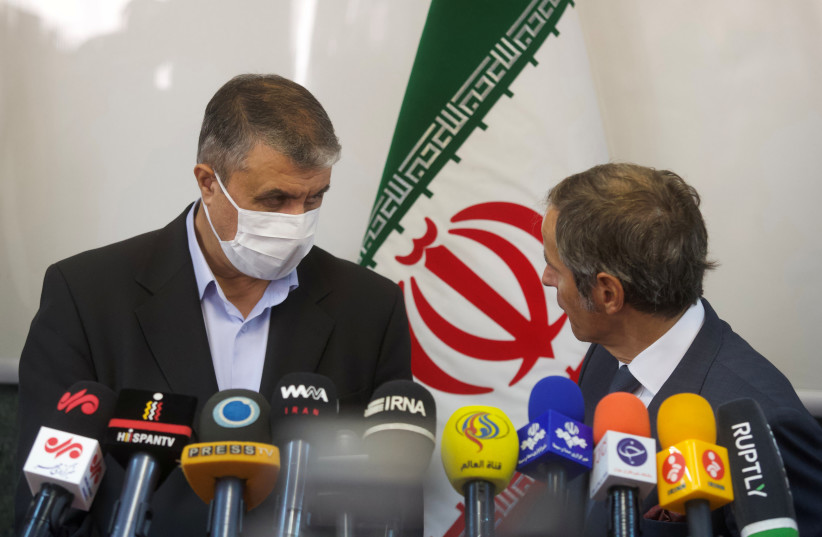The US left the JCPOA in 2018, citing continued malign behavior by Iran in the region, and implementing a “maximum pressure” sanctions regime, but Biden seeks a return to the policy.
Iranian Foreign Minister Hossein Amirabdollahian on Wednesday said Iran would return to talks to reach a nuclear agreement “soon,” but made no commitment to a specific date for resuming the stalled negotiations to revive the 2015 Joint Comprehensive Plan of Action with the world’s leading powers.
Following a meeting with Russian Foreign Minister Sergei Lavrov in Moscow, Amirabdollahian said that “the process of reviewing Vienna talks is nearing completion and the talks will resume soon.
“Until Iran returns to the negotiating table, the other parties must also make new decisions and show their will and intention for the success of the talks and fulfilling their commitments,” he added.
Earlier, Amirabdollahian told the head of Iranian foundations in Moscow that a return to the nuclear deal could bolster Iran’s economy, “if we achieve tangible achievements in securing the rights of the Iranian people,” Iranian Mehr News Agency reported.
“If the negotiation process, like the previous eight years, is going to continue in the same direction, that is, negotiations for negotiations, the Islamic Republic of Iran will take the appropriate decision,” he stated.
Lavrov spoke with US Secretary of State Antony Blinken shortly before his meeting with Amirabdollahian, at Blinken’s initiative, according to the Russian readout of the call.

“The sides exchanged views on the prospects for restoring the full implementation of the JCPOA for the Iranian nuclear program’s settlement, and also addressed a number of relevant issues on the bilateral agenda,” the Russian Foreign Ministry stated.
Lavrov called the meeting with Amirabdollahian “very timely,” adding that “the focus of today’s negotiations will be the need for a full renewal of the Iranian nuclear program agreement, without any exemptions or additions. We would like to discuss how this process can be expedited.”
The Lavrov-Amirabdollahian meeting in Moscow took place four months after Iran walked away from indirect negotiations with the US in Vienna designed to return to the JCPOA, which restricted the Islamic Republic’s enrichment of uranium enrichment until 2030, in exchange for lifting sanctions. Iran said it would have to wait until after its election, which took place in June, and the formation of a new government to continue talks.
The US left the JCPOA in 2018, citing continued malign behavior by Iran in the region, and implementing a “maximum pressure” sanctions regime. The Biden administration seeks to roll back its predecessor’s policy and return to the JCPOA, before opening further negotiations to make the Iran deal “longer and stronger.”
Iran, however, has far surpassed the JCPOA’s limitations this year, enriching uranium up to 60%, a step away from the 90% needed for a bomb. It also began developing uranium metal, which the European parties to the nuclear deal – UK, France and Germany – have pointed out has no credible civilian use.
Officials in Iranian President Ebrahim Raisi’s government have made vague statements, similar to Amirabdollahian’s, about returning to the Vienna talks, but have not set a time frame.
“Iran will eventually return to the talks in Vienna. But we are in no rush to do so, because time is on our side. Our nuclear [development] advances further every day,” a senior Iranian official told Reuters on condition of anonymity.
Western states have expressed frustration at the delays.
Blinken said last week of the negotiations: “The ball remains in their court, but not for long.”
The secretary of state explained that Iran is nearing the point of advancement in its nuclear program at which the benefits of the JCPOA will no longer be relevant.
A French presidency official told reporters last week: “To avoid an escalation, Iran must return to the negotiating table…. The more time passes, the harder it becomes to return to the negotiating table.”
National Security Advisor Jake Sullivan emphasized in a meeting with Israeli counterpart Eyal Hulata on Tuesday that US President Joe Biden is committed to ensuring Iran never gets a nuclear weapon.
“This administration believes diplomacy is the best path to achieve that goal, while also noting that the president has made clear that if diplomacy fails, the United States is prepared to turn to other options,” Sullivan’s spokesperson said.
